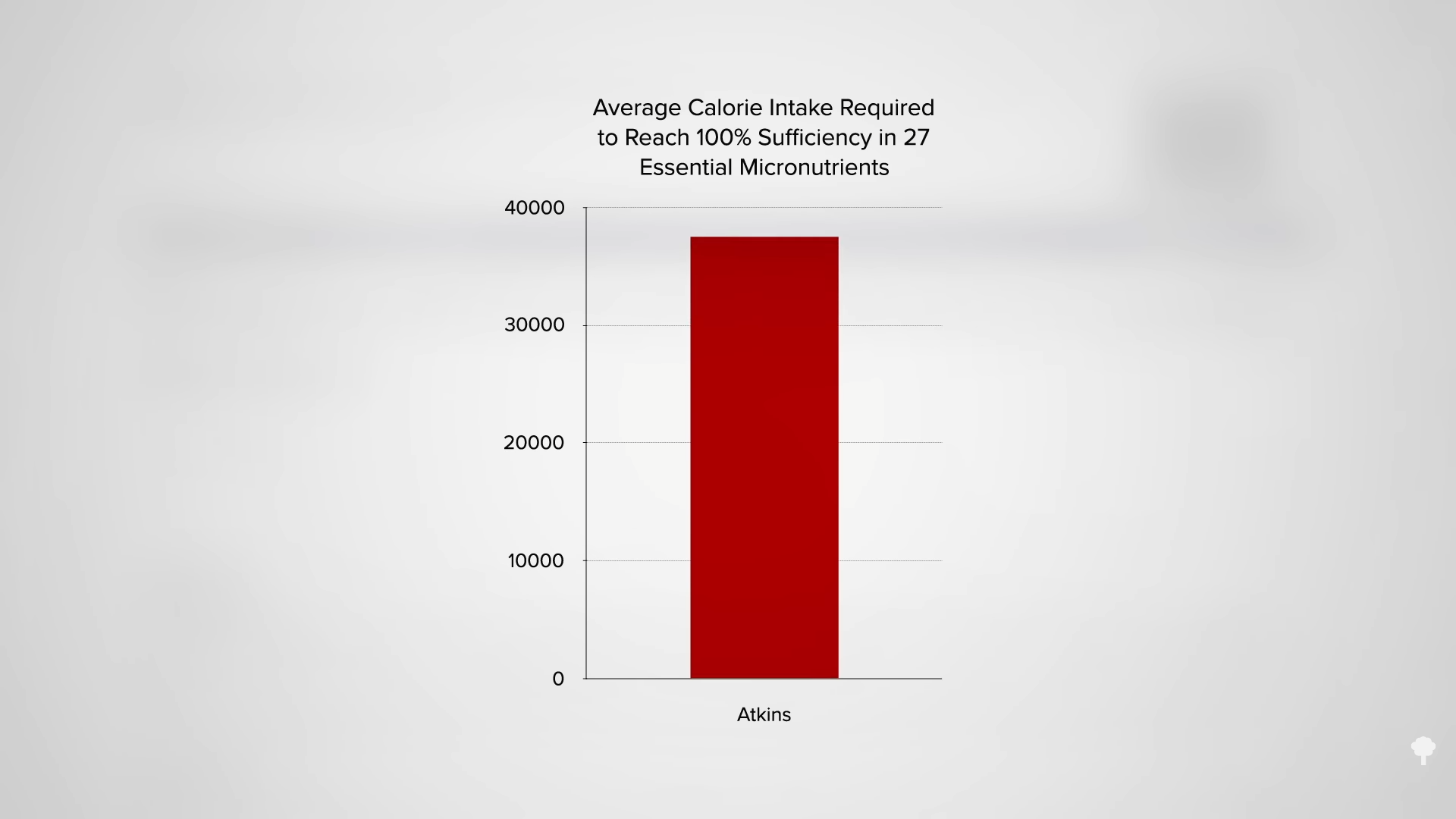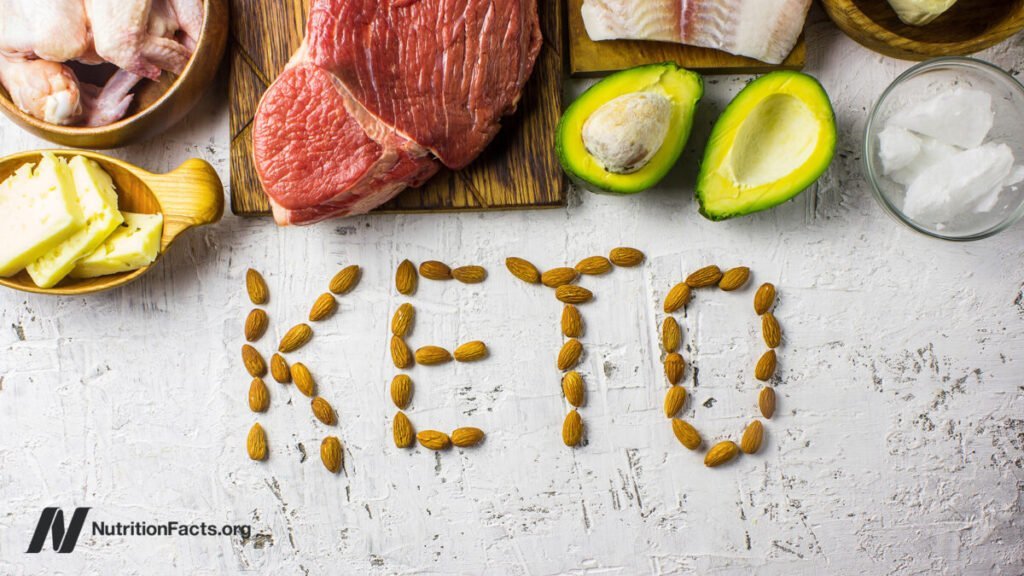How do ketogenic diets impact nutrient adequacy, intestinal flora, and heart disease risk?
Given the extensive use of ketogenic diets for specific cases of childhood epilepsy, a body of safety information has been assembled. The apparent issue is nutrient insufficiency. Insufficient ingestion of 17 micronutrients, vitamins, and minerals has been recorded in individuals following strict ketogenic diets, as you can observe in the diagram below and at 0:14 in my video “Are Keto Diets Safe?”
Dieting is an especially critical period to guarantee that you meet all of your essential nutrient needs since you might be consuming less food. Ketogenic diets tend to be so nutritionally deficient that one assessment estimated that you would have to consume over 37,000 calories per day to obtain a sufficient daily intake of all essential vitamins and minerals, as you can see in the diagram below and at 0:39 in my video.

This is one of the benefits of more plant-based approaches. As the editor-in-chief of the Journal of the American Dietetic Association stated, “What could be denser in nutrients than a vegetarian diet?” Choosing a healthy diet may be simpler than consuming more than 37,000 daily calories, which is akin to adding 50 sticks of butter to your morning coffee.
We are not just discussing failure to meet your daily allowances either. Children have developed scurvy on ketogenic diets, and some have even passed away due to selenium deficiency, which can lead to sudden cardiac death. The vitamin and mineral deficiencies can be resolved with supplements, but what about the scarcity of prebiotics, the numerous types of fiber, and resistant starches found in high quantities in whole grains and beans that you would miss out on?
Unsurprisingly, constipation is quite prevalent on keto diets. As previously discussed, depriving our microbial selves of prebiotics can have a wide range of negative consequences. Ketogenic diets have been demonstrated to “diminish the species richness and diversity of intestinal microbiota,” our gut flora. Changes in the microbiome can be identified within 24 hours of transitioning to a high-fat, low-fiber diet. A lack of fiber starves our beneficial gut bacteria. Previously, it was believed that nearly all dietary fat was absorbed in the small intestine; however, based on studies utilizing radioactive tracers, we now understand that about 7 percent of the saturated fat in a fat-rich meal can reach the colon. This may result in “adverse changes” in our gut microbiome, as well as weight gain, increased intestinal permeability, and pro-inflammatory changes. For instance, there might be a reduction in beneficial Bifidobacteria and a decline in overall production of short-chain fatty acids, both of which would be expected to raise the risk of gastrointestinal disorders.
Addressing the crux of the matter, what impact might all that saturated fat have on our heart? When examining low-carbohydrate diets and overall mortality, individuals who consume lower-carb diets experience “a substantially greater risk of all-cause mortality,” meaning they live, on average, significantly shorter lives. Nevertheless, from a heart disease standpoint, it is relevant whether it is animal fat or plant fat. According to the renowned Harvard cohorts, consuming more of an animal-based, low-carb diet was linked to higher death rates from cardiovascular disease and a 50 percent higher risk of dying from a heart attack or stroke, but no such association was found for lower-carb diets based on plant sources.
Furthermore, it wasn’t just Harvard. Other researchers have also discovered that “low-carbohydrate dietary patterns favoring animal-derived protein and fat sources, from sources such as lamb, beef, pork, and poultry, were associated with higher mortality, whereas those that favored plant-derived protein and fat intake, from sources such as vegetables, nuts, peanut butter, and whole-grain bread, were associated with lower mortality…”
Cholesterol production in the body is directly linked to body weight, as can be observed in the diagram below and at 3:50 in my video.

Every pound of weight loss by almost any means is linked with about a one-point decrease in blood cholesterol levels. However, when individuals adopt very-low-carb ketogenic diets, the beneficial impact on LDL bad cholesterol is diminished or completely nullified. Counteracting modifications in LDL or HDL (formerly considered good cholesterol) are not deemed sufficient to offset this risk. You do not need to wait for cholesterol to accumulate in your arteries to experience negative effects; within three hours of consuming a meal high in saturated fat, a considerable decline in artery function can be observed. Even with a reduction of several pounds in body weight, artery function deteriorates on a ketogenic diet as opposed to showing improvement, which appears to be the case with low-carb diets in general.
For additional information on keto diets, view my video series here.
And, to learn more about your microbiome, check the related videos below.
[ad_2]



5 Comments
Hey! Do you know if they make any plugins to assist with Search Engine Optimization? I’m trying to
get my website to rank for some targeted keywords but I’m not seeing very good
results. If you know of any please share. Thank
you! You can read similar article here: Wool product
Hey there! Do you know if they make any plugins to help with Search Engine Optimization? I’m trying to
get my blog to rank for some targeted keywords but I’m not seeing very good success.
If you know of any please share. Kudos! You can read similar
blog here: Change your life
I am really impressed with your writing abilities as smartly as with the structure on your weblog. Is that this a paid subject matter or did you modify it yourself? Anyway keep up the nice quality writing, it is uncommon to look a nice blog like this one today. I like nutrigladiators.com !
I am extremely impressed together with your writing skills as well as with the format for your blog. Is this a paid topic or did you modify it yourself? Anyway keep up the excellent high quality writing, it’s uncommon to look a great weblog like this one today. I like nutrigladiators.com ! I made: Fiverr Affiliate
I am extremely inspired along with your writing abilities and also with the format on your weblog. Is that this a paid subject or did you customize it yourself? Anyway stay up the nice high quality writing, it’s rare to see a great weblog like this one today. I like nutrigladiators.com ! Mine is: Beehiiv